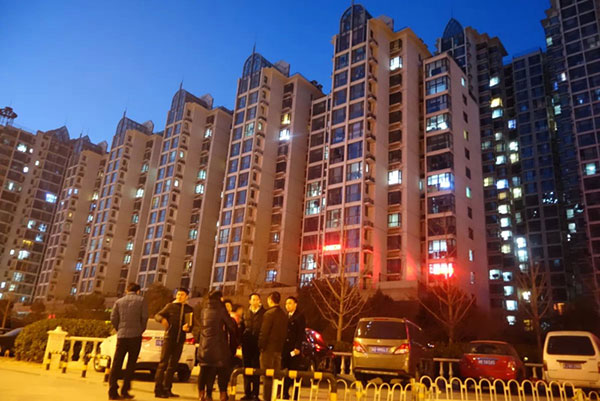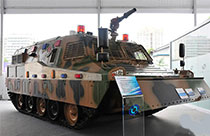

 |
| Real estate agents talk with potential clients at the entrance to a residential compound in Yanjiao, Hebei province, Jan 11, 2015. [Photo by Song Wei/chinadaily.com.cn] |
More young people are starting to choose cities around Beijing as their base for work and living as the integrated development of the Beijing-Tianjin-Hebei region provides new opportunities, Beijing Youth Daily reported.
A post-1980s entrepreneur, surnamed Wei, has opened an innovative education institute at a business incubator in an economic-technical development zone in Qinhuangdao, North China's Hebei province, where his wife lives, after 10 years running a business in the capital.
"I commuted between Beijing and Qinhuangdao by rail for quite a time. I was struggling for money and with my health. Such a life is too tiring," he said.
In February, President Xi Jinping called for the coordinated development of the region around Beijing to build a trilateral economic sphere in the Bohai Bay area.
The Jing-Jin-Ji integration (Jing is for Beijing, Jin means Tianjin, Ji is traditional use as in Hebei province) has been planned as a national strategy to alter functions of the regions around the capital and ease Beijing's oversized population, congestion and pollution.
As part of the three regions taking over non-capital functions from Beijing, Qinhuangdao economic-technical development zone built up a base for scientific research institutes to relocate in May last year and a business incubator for high and new technology companies early this year.
"The incubator provides projects and start-ups with services such as an office, early investment and industry chain incubation. Qualified companies can also enjoy rent-free office space for 6 to 24 months," said Lyu Aiguo, deputy director of the management committee at the zone.
Wei's company is one of the beneficiaries.
"My company enjoys preferential policies in many areas, such as registration. The office is also free of charge," said Wei.
More than 10 companies have settled in the incubator, either branches of Beijing-headquartered businesses or set up by Qinhuangdao residents who used to work in the capital, said an incubator employee.
These forward-thinking young people are not satisfied with only working in desirable places but also living there.
A Qinhuangdao local, surnamed Su, who worked for five years in Beijing following graduation, has bought an apartment in his hometown.
"Though Qinhuangdao offers less job opportunities and earnings than Beijing, I will come back as long as there is a favorable job here. Who wants to struggle one's life away from home?" he said.
With the construction of the cross-regional traffic network, a one-hour commuting circle is forming around Beijing, with Qinhuangdao just included.
Like Su, many people plan to settle in Qinhuangdao, a livable coastal city, and are purchasing property.
From the beginning of this year, house-buying groups from Beijing are made up of more and more young people, most of whom are Qinhuangdao natives who work in Beijing. They want to either live by themselves or give places to their parents, said a real estate agent, surnamed Liu.
"The situation is much different from several years ago. With the integrated development of the Beijing-Tianjin-Hebei region, many people's hometowns have new growth points and they are considering coming back to look for a job", said Liu.
In an encouraging sign, housing loan policies have paved a way for regional integration.
Qinhuangdao signed a deal in 2009 with Beijing allowing residents to use loans from Beijing authorities for buying a house in Qinhuangdao.
"Implementation of this housing loan deal benefits Qinhuangdao's geographical advantage with Beijing and the integrated development of the Beijing-Tianjin-Hebei region", said Huang Jingdi, head of credit and loan department of Qinhuangdao Housing Provident Fund Administration Center.
A total of 120 million yuan worth of loans in 470 payments were allocated from Beijing authorities for buying houses in Qinhuangdao as of February, according to the Qinhuangdao Housing Provident Fund Administration Center.
The guideline for the cooperative development of the Jing-Jin-Ji regions was passed in April with more detailed policies and plans in the pipeline.
According to the guideline, Beijing holds its position as a political, cultural, innovative and diplomatic center while Tianjin works as an experimental research hub for R&D, global shipping, finance and economic reform. Hebei is set for industry transformation and logistics.
The concept of the supercity needs strong infrastructure construction, especially transportation.
On July 20, the Beijing Municipal Commission of Transport announced its plan to upgrade existing road construction to a new level - connecting all main highways and the public railway network.
With the development of transportation among the three regions, people in the Jing-Jin-Ji region will be linked easily. The development of high-speed rail with the average speed of 240 to 300 km per hour makes it possible for people to commute between neighboring cities within an hour, which expands the people's living space.
Telecom carriers will scrap roaming fees for cross-district phone calls around the region including Beijing, Tianjing and Hebei province from Aug 1, according to a China National Radio report.
 Student proposes during graduation ceremony
Student proposes during graduation ceremony China-made special vehicles in exhibition
China-made special vehicles in exhibition Soldiers serving at Liaoning aircraft carrier
Soldiers serving at Liaoning aircraft carrier Bikini beauties lifeguards in river rafting place
Bikini beauties lifeguards in river rafting place PLA soldiers eat raw snake meat in harsh training
PLA soldiers eat raw snake meat in harsh training Kiss contest held in Nanning, SW China
Kiss contest held in Nanning, SW China Yunnan-Myanmar Road: The past and present
Yunnan-Myanmar Road: The past and present Photos of beautiful policewoman become online hit
Photos of beautiful policewoman become online hit Campus belle of Xiamen University gets popular online
Campus belle of Xiamen University gets popular online Belt of possibility
Belt of possibility ‘Abnormal’ stock dip to be probed: CSRC
‘Abnormal’ stock dip to be probed: CSRC TPP’s geopolitical leverage may be inflated
TPP’s geopolitical leverage may be inflated ‘Tiger mothers’ turn out to have deep pockets that fuel kids’ success
‘Tiger mothers’ turn out to have deep pockets that fuel kids’ successDay|Week